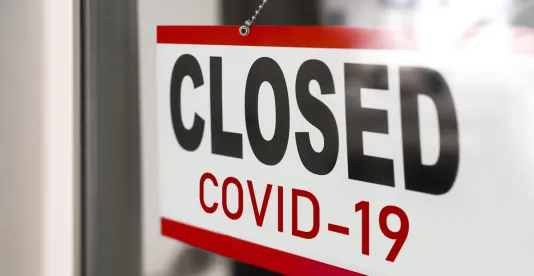With COVID-19 cases on the rise across the country and in New England, many states in the region have issued new orders and guidance scaling back or reversing reopening plans in order to slow the spread of the virus.
Some states, like Massachusetts and Rhode Island, are issuing targeted, time-limited measures to address increases in transmission in smaller social gatherings and at sporting events, including imposition of a curfew in Massachusetts. Others are revising their travel and quarantine restrictions. A summary of key changes is below. Our state by state summary of reopenings in New England is available here and our alert on travel restrictions is available here.
Connecticut
Effective October 15, Order 9G permits municipalities to revert to more restrictive Phase 2 restrictions and capacity limitations from the state’s current Phase 3 guidance. A comparison of the two is available here, and a list of the municipalities that have chosen to revert is available here.
Governor Ned Lamont has also urged stricter enforcement of the state’s various COVID-19-related restrictions following incidents at Connecticut bars. Capacity for restaurants is currently set at 75% with an indoor gathering cap throughout the state of 100 people. Only bars that serve food are permitted to open.
Maine
On November 1, Governor Janet Mills announced the extension of the state’s Keep Maine Healthy program through December and an end to exemptions from the state’s travel and quarantine requirements for Connecticut, New Jersey, and New York, effective November 4.
People coming into Maine from these states, including Maine residents returning from these states, must either quarantine for 14 days or receive a negative COVID-19 test with a sample taken less than 72 hours from arrival in Maine, quarantining while awaiting test results. Massachusetts, New Hampshire, and Vermont remain exempt.
Additionally, effective November 4, indoor gatherings will revert to a maximum of 50 people, regardless of capacity. Outdoor capacity limits remain at 100 people, and occupancy limits for retail establishments will remain at five people per 1,000 square feet of shopping space. The expected November 2 reopening of bars and tasting rooms for indoor service has been postponed until further notice.
Massachusetts
On November 2, Governor Charlie Baker announced a number of orders outlining targeted measures in response to the recent increase in COVID-19 cases and hospitalizations. Compliance with the Stay at Home Advisory requires residents to stay home from 10 p.m. to 5 a.m except to go to work or school, or for other essential needs such as grocery shopping or picking up medicine. It also advises against gatherings in your home with anyone outside of your household.
Order 53 imposes a mandatory nighttime closing period for 16 types of businesses and facilities, including:
- Restaurants: may continue to offer takeout and delivery during the mandatory closed period
- Indoor and outdoor events and theaters, including drive-in theaters
- Youth and amateur sports activities
- Golf facilities and recreational boating
- Close contact personal services
- Fitness centers and health clubs
- Museums and cultural and historical facilities
In addition, the order prohibits the sale of alcohol during the closing period by any person, business, establishment, or license holder, and specifically applies to all retailers, restaurants, private clubs, events, and delivery services licensed to offer or sell alcohol. A similar restriction on the sale of adult-use cannabis is also in place. Violations of this order may result in a civil fine of up to $500 per violation and may also be enforced by injunction.
Effective November 6, Order 54 reduces gathering sizes. Under this order, the following limitations apply:
- Private residences: indoor gatherings limit to 10 people and outdoor gatherings are limited to 25
- Indoor gatherings at event venues and in public settings are limited to 25
- Outdoor gatherings at event venues and in public settings:
- Lower risk communities:up to 100 people
- Communities that do not qualify as lower risk:up to 50 people
These limitations apply to all social, community, civic, public, and leisure events, as well as conferences, conventions, fundraisers, and other similar events. Critically, on-site workers and staff who provide services to participants in these gatherings do not count toward the capacity limits. The order also requires that organizers of gatherings report known positive COVID-19 cases to the local health department and requires cooperation with contact tracing.
Other than businesses subject to indoor and outdoor event guidance, no other industry is subject to this limitation as long as it complies with its sector-specific guidance. Gatherings for religious activities and outdoor gatherings for political expression are also exempt, but indoor gatherings for either must follow applicable sector-specific capacity limitations.
Following Order 53, all gatherings must end by 9:30 p.m. with the exception of religious and political gatherings. The order also incorporates Order 55 (rescinding Order 31), requiring face coverings in public places by all persons over the age of five. Masks are also encouraged at all gatherings at private homes, but only required when such gatherings include more than 10 people and attendees include non-household members. Order 55 includes exceptions for the requirement to wear a face mask.
As with prior orders, the new restrictions in Order 54 do not apply to federal government entities, health care facilities, or workplaces or facilities with specialized functions such as polling places, public and private schools, residential and day schools for special needs students, or Department of Correction facilities.
Violations of this order may result in a civil fine of up to $500 per violation and may also be enforced by injunction.
New Hampshire
New Hampshire has not reinstated any restrictions, and continues reopening, including a return to play hockey, effective October 30.
Rhode Island
On October 30, Governor Gina Raimondo issued Order 90, amending the Phase 3 order from just two days prior (Order 88). Under this amended order, the gathering size for both indoor and outdoor social gatherings has been lowered from 15 to 10.
Outdoor social gatherings at a restaurant or with licensed catering, such as a wedding, may have up to 100 people. Faith leaders and houses of worship are strongly encouraged to expand the offering of or otherwise reinstate virtual services. Additionally, hospitals and nursing homes will be restricting patient visitation. The following changes have also been made for sports:
- Indoor sports facilities: all ice rinks and indoor sports facilities will be closed for one week (Nov. 2 through Nov. 8); this does not apply to facilities to the extent that they are used for purposes other than sports activities or for activities of professional or collegiate athletic programs.
- Effective October 30: spectators will no longer be allowed at any sporting event or practice, except where athletes are 10 years old or younger, in which case one parent or guardian may be present.
Vermont
Vermont has also issued new guidance for organized sports, which contains different rules for indoor and outdoor sports, depending on the amount of contact that activity includes. The guidance also makes clear that Vermont-based sports teams are subject to the state’s travel restrictions, meaning that they would be required to quarantine upon return to the state if they leave to participate in any competition in a non-exempt county.




 />i
/>i
